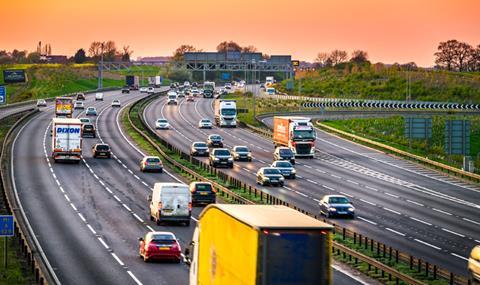
Platooning HGVs will be on major UK roads by the end of 2018, after the government committed £8.1m to trials of the autonomous vehicles.
The trials, which will be funded by DfT and Highways England and conducted by the Transport Research Laboratory, will see up to three HGVs travelling in convoy connected by wireless technology.
All of the vehicles will have a driver ready to take control of the vehicle if needed.
The trial will take place in three phases, beginning on a track and progressing to major road networks. The platoons are expected to be on major roads by the end of next year.
DfT said if successful, platooning HGVs could save the industry money and improve air quality and congestion on the UK's roads. However it said testing wouldn't happen until there was "robust evidence that it can be done safely".
Transport minister Paul Maynard said: "We are investing in technology that will improve people’s lives. Advances such as lorry platooning could benefit businesses through cheaper fuel bills and other road users thanks to lower emissions and less congestion.
"But first we must make sure the technology is safe and works well on our roads, and that’s why we are investing in these trials."
The government announced its intention to trial platooning last year, and a similar trial is planned to take place in Germany next spring.
The FTA welcomed the announcement of the trials, and said the government must work quickly to determine whether platooning HGVs present a safe and reliable future for the industry.
The association’s head of national policy Christopher Snelling said: “Platooning could be a real opportunity to optimise logistics on the road – we need to know if it is the way forward as soon as possible.
Snelling explained that traveling closely together, platooning HGVs take up less space on the road and improve traffic flow by travelling at a constant speed.
“However," he said, "the system has to be shown to be safe on the roads and to deliver the promised benefits. The sooner the trial takes place, the sooner the UK logistics industry, which represents 11% of the UK’s non-financial business economy, can know if this will be the right route for the future."
The RHA was more critical of the move, having previously deemed UK roads unsuitable for platooning trucks.
Chief executive Richard Burnett said that the focus seemed to be on technology instead of safety.
He said: "Of course we welcome improvements to the way the road freight industry works and we understand the benefits that such a mode of operation would bring.
“However,” he continued, “currently the focus seems to be on the technology behind the system. Safety has to come first and it cannot be compromised. It is crucial that this element of the concept gets the highest priority.”
TRL will work on the trial with a consortium of businesses including DAF Trucks and DHL.
Its chief executive Rob Wallis said the trials give the UK the an “unprecedented opportunity to lead the world in trialling connected vehicle platoons in a real-world environment”.
“TRL and its consortium of leading international partners, have the practical and technical knowledge gained from previous projects to understand what is required to put a connected vehicle platoon on to UK roads safely. The team are now taking that expertise and uniquely applying it within live traffic operations.”














